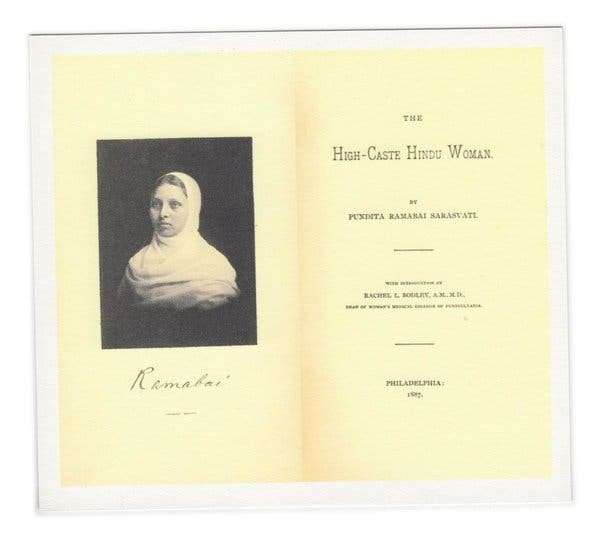Pandita Ramabai Sarasvati (1858-1922) was an Indian social reformer and Christian missionary. Almost everything I say about her can be found in her own writings. Ramabai is one of my heroes of faith.
Let me just add that I was once a “Hindu,” by which I mean I used to practice one of the forms of religion found in India. Like Ramabai, I value my Hindu heritage, since it led me to Christ.
Ramabai was born a high-caste Brahmin. Her mother tongue was Marathi. Her father, Anant Shastri Dongre was an honoured Sanskrit scholar. But he broke tradition: he taught his wife and daughter the sacred language. This equipped Ramabai for the work she did in her life of 64 years.
Her family moved often. They lived simply, in rural areas. Her father taught Sanskrit and gave readings of Hindu scriptures, in return for freewill offerings. In the last years of her parents lives, the family of five travelled from temple-to-temple on pilgrimages to “find God”.
Her parents and sister died in 1877, in the middle of a three-year famine. As he was dying, her father, who loved her deeply, made her promise that she would live always as a God-seeking, God-pleasing, righteous person.
She and her brother, now orphans, continued to travel and teach the Hindu scriptures. Because that was the only “work” they knew how to do.
Scholars at Calcutta university heard about her command of Sanskrit. They examined her. They awarded her the titles of “Pandita” which means learned person, and “Sarasvati”, the name of the goddess of wisdom. They did this though they knew that she had no formal education.
They gave Ramabai a job teaching what the Hindu scriptures require of women. This meant teaching that wives must regard their husbands as gods and live as their slaves, for that’s the only way to achieve moksha, release from this life; and after many rebirths, be born a male Brahmin.
Ramabai and her brother grew less and less convinced by the truth or value of Hindu beliefs and practices. They began to seek learning and meaning outside “religion”. They made friends outside religious circles.
In 1880, her brother died. She married his friend Bipin, born a low-caste Sudra. Bipin was a lawyer. His mother-tongue was Bengali.
Their marriage was inter-caste and inter-regional. They had a daughter. They chose for her the name “Manorama”, which means “delightful”. This was a radical choice, because for girls, it was normal to choose names of goddesses who were always subject to male gods.
The mixed marriage made it hard for Bipin to get clients and to work in the legal profession in Calcutta. So, they moved to another city, Silchar.
There, she came across a copy of the Gospel of Luke. She read it and was enthralled by Jesus.
Less than two years into their marriage, Bipin died. Ramabai was now an orphan, a widow and a single parent – all of whom were without status or protection. Ramabai wrote and spoke for these marginalized people.
She was courted by Hindu reform groups, led by rich folks. They invited her to give speeches. She moved to Pune. She spoke before the Education Commission. She urged them to educate girls and women.
She wrote a book, in Marathi. It was called “The Morality of Women.” In it, she exposed Hindu scriptures which urge the suppression of women.
She received funding to travel to England to improve her English, and hoped to study medicine. While there, the Gospel of John drew her to commit herself to obeying Jesus as Lord. She got baptized.
She studied the work Christians were doing in London to help needy women. She longed to do the same for women and children in India.
From England, she went to the USA, to attend the graduation, as doctor, of her female cousin, Anandibai Joshee. She stayed for two years. She travelled to raise funds to begin a work among women and children in India. She wrote “The High Cast Hindu Woman,” which contains this line:
“Those who diligently and impartially read Sanskrit literature in the original, cannot fail to recognize the law-giver Manu as one of those hundreds who have done their best to make woman a hateful being in the world’s eye.”
The book made her more unwelcome among Hindus, including reformers.
In 1889, she established the Sharada Sadan (Home of Wisdom), a school in Bombay for child widows. She promised not to pressure the girls to convert to Christianity, but her daily devotional practices attracted many to embrace Christ as Lord and saviour.
In the late 1890s, she founded the Mukti (Salvation) Mission in Kedgaon, near Pune. This mission provided shelter and vocational training to destitute women and orphans. Eventually, it supported thousands. During a famine in 1896, she sheltered and fed thousands.
She mastered Hebrew and Greek and translated the Bible into Marathi, her mother tongue. She took over 12 years to do this.
Tragedy struck again. Her daughter, whom she hoped would succeed her, died before she did.
Her work was driven by her deep faith in Jesus and her desire to show his love through action.
She passed away, aged 64 years, on April 5, 1922.
I wrote this account of Ramabai while meditating on Hebrews 12:1-3, which is a portion of the lectionary reading for Sunday August 15, 2025. If you’d like to learn more about Ramabai, you can start by reading these:
Untold Tale of Revival: Pandita Ramabai, Gregory Perry.
Pandita Ramabai A pioneer Bible translator – Wycliff Bible Translators
To learn more about Rama, click here.


